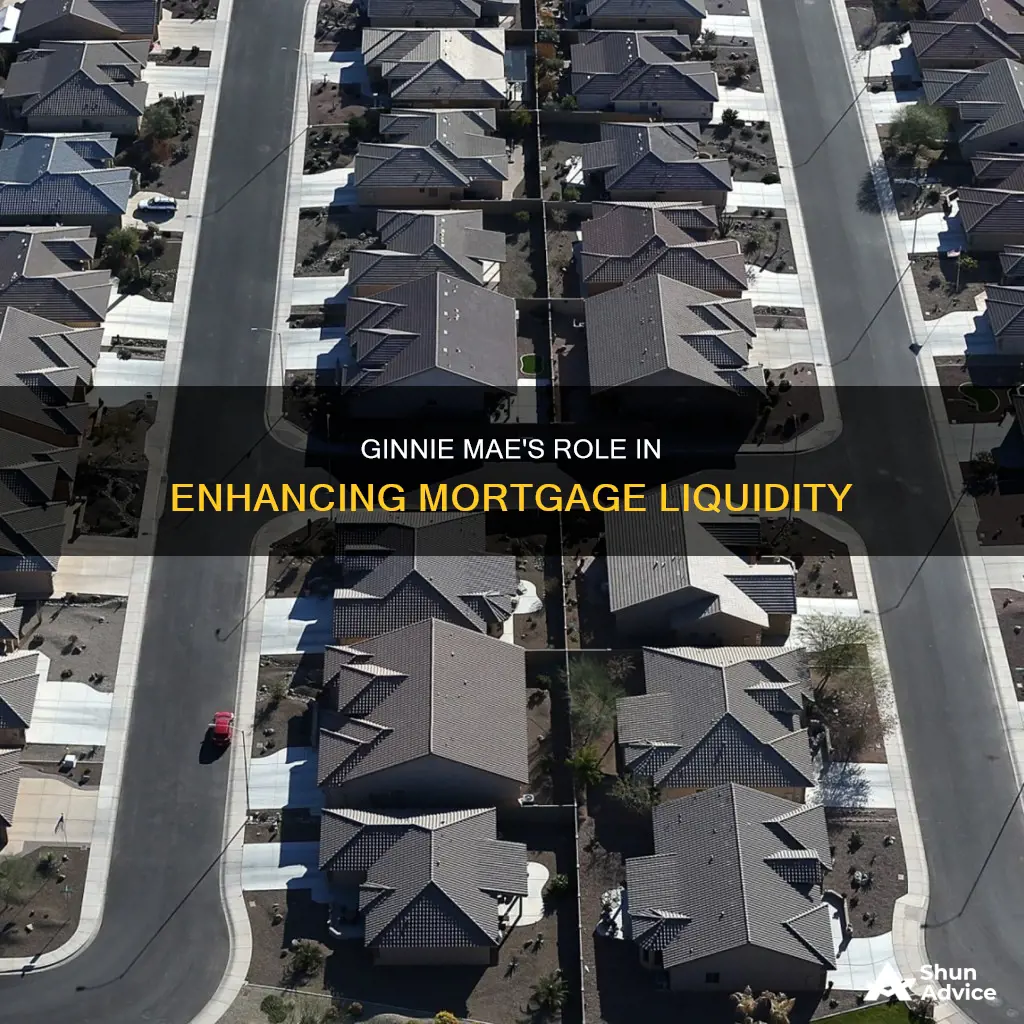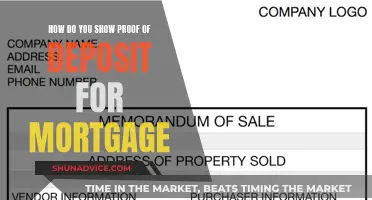
The Government National Mortgage Association (GNMA), also known as Ginnie Mae, is a government-owned corporation that works to expand affordable housing by guaranteeing the timely payment of principal and interest on mortgage-backed securities (MBSs). By doing so, GNMA helps to attract capital to the market for federally insured mortgages, thereby reducing costs for mortgage borrowers and minimising risk to taxpayers. GNMA guarantees only securities backed by single-family and multifamily loans insured by government agencies, including the Federal Housing Authority, the Department of Veterans Affairs, and the Department of Agriculture's Rural Housing Service. This guarantee provides investor protection against borrower defaults and helps to make affordable housing more widely available.
| Characteristics | Values |
|---|---|
| Type of Organisation | Government-owned corporation |
| Parent Department | Department of Housing and Urban Development (HUD) |
| Date Established | 1968 |
| Objective | Expand affordable housing by guaranteeing housing loans (mortgages) |
| Target Audience | First-time homemakers, low-income borrowers, and other underserved groups |
| Working | Guaranteeing timely payment of principal and interest on mortgage-backed securities (MBSs) |
| Risk Mitigation | Guarantees payment to investors even if homeowners default on the underlying mortgages |
| Credit Risk | Resides with other insuring government agencies |
| Insurance | Does not provide insurance to lenders against credit risks from borrowers |
| Liquidity | Provides liquidity in the market for home loans directly guaranteed by the US government |
| Interest Rates | Based on the market rather than the credit score |
What You'll Learn
- GNMA guarantees timely payments on mortgage-backed securities
- GNMA provides liquidity in the market for home loans
- GNMA helps open the home mortgage market to first-time homemakers
- GNMA provides low-cost financing for federal housing programs
- GNMA guarantees only securities backed by single-family and multifamily loans

GNMA guarantees timely payments on mortgage-backed securities
The Government National Mortgage Association (GNMA), or Ginnie Mae, is a government-owned corporation within the US Department of Housing and Urban Development (HUD). It was founded in 1968 to expand affordable housing by guaranteeing the timely payment of principal and interest on mortgage-backed securities (MBSs).
Ginnie Mae does not originate or purchase mortgage loans, nor does it buy, sell, or issue securities. Instead, it guarantees investors the on-time payment of MBSs, even if homeowners default on the underlying mortgages. These MBSs are created by private financial institutions from mortgages insured or guaranteed by federal programs, such as the Federal Housing Administration (FHA), the Department of Veterans Affairs (VA), and the Department of Agriculture's Rural Housing Service (RHS).
Ginnie Mae's guarantee of timely payments on MBSs has several benefits. Firstly, it makes MBSs more attractive to investors, as they are assured of receiving their principal and interest payments on time, regardless of whether the mortgage borrowers make their payments. This, in turn, helps to attract capital to the market for federally insured mortgages, providing liquidity and reducing costs for mortgage borrowers. Secondly, Ginnie Mae's guarantee enables lenders to obtain better prices for their mortgage loans in the secondary mortgage market, allowing them to fund new mortgage loans and promote affordable homeownership.
Ginnie Mae securities are unique in that they are the only MBSs backed by the "full faith and credit" guaranty of the US federal government. This means that investors with shares in Ginnie Mae funds can be confident that their investments are secure, even in the event of mortgage defaults. By guaranteeing timely payments on MBSs, Ginnie Mae improves the marketability of mortgages by making them more attractive to investors, increasing liquidity, and reducing costs for borrowers.
Secondary Residence: Mortgage Impact and Considerations
You may want to see also

GNMA provides liquidity in the market for home loans
The Government National Mortgage Association (GNMA), or Ginnie Mae, is a government-owned corporation within the Department of Housing and Urban Development (HUD). It was founded in 1968 to expand affordable housing by guaranteeing the timely payment of principal and interest on mortgage-backed securities (MBSs).
Ginnie Mae provides liquidity in the market for home loans by guaranteeing investors the on-time payment of MBS even if homeowners default on the underlying mortgages. These MBS instruments are commonly referred to as "pass-through" certificates because the principal and interest of the underlying loans are "passed through" to investors. Ginnie Mae's guarantee ensures that investors with shares in Ginnie Mae funds never have to worry about the impact of late payments or mortgage defaults on their investments.
Ginnie Mae securities are the only MBS that are backed by the "full faith and credit" guaranty of the US Federal Government. This means that when a mortgage borrower fails to make payments, Ginnie Mae covers them. Ginnie Mae's efforts aid those traditionally underserved in the mortgage market, including first-time homemakers, low-income borrowers, and other underserved groups.
Ginnie Mae does not originate or purchase mortgage loans, nor does it buy, sell, or issue securities. Instead, it works with other government agencies to make affordable housing widely available through mortgage loans. Ginnie Mae connects the US housing market to capital markets, providing low-cost financing for federal housing programs through the Federal Housing Administration (FHA), Veterans Affairs (VA), the Department of Agriculture, and HUD's Public and Indian Housing.
Appraisal's Impact: Understanding Mortgage's Key Determinant
You may want to see also

GNMA helps open the home mortgage market to first-time homemakers
The Government National Mortgage Association (GNMA), or Ginnie Mae, is a government-owned corporation within the Department of Housing and Urban Development (HUD). It was founded in 1968 to promote affordable homeownership and expand access to affordable housing.
GNMA's role as a government-backed entity provides confidence and stability to the housing market. It ensures that investors with shares in GNMA funds are protected from the impact of late payments or mortgage defaults. When borrowers fail to make payments, GNMA steps in to cover them, reducing the risk for investors and lenders.
By partnering with other government agencies, GNMA works to make affordable housing more widely available through mortgage loans. It primarily provides liquidity to the market, supporting the free flow of capital and keeping government-backed loans affordable for non-bank and other mortgage lenders.
Through its efforts, GNMA has helped to reduce financing costs, such as interest rates, making homeownership more accessible to first-time homemakers and other underserved groups.
Understanding Your Mortgage Statement: A Visual Guide
You may want to see also

GNMA provides low-cost financing for federal housing programs
The Government National Mortgage Association (GNMA), also known as Ginnie Mae, is a government-owned corporation within the Department of Housing and Urban Development (HUD). It was established in 1968 to promote affordable homeownership.
Ginnie Mae provides low-cost financing for federal housing programs through the Federal Housing Administration (FHA), Veterans Affairs (VA), the Department of Agriculture, and HUD's Public and Indian Housing. It does not originate or purchase mortgage loans, nor does it buy, sell, or issue securities. Instead, it guarantees the timely payment of principal and interest on mortgage-backed securities (MBSs) created by private financial institutions from mortgages insured or guaranteed by federal programs. This guarantee helps attract capital to the market for federally insured mortgages, reducing costs for borrowers while minimising risk to taxpayers.
Ginnie Mae's role in providing low-cost financing is facilitated by its ability to package mortgages into bonds and make them available to investors in the bond market. These bonds, or MBSs, are considered safe investments due to their backing by the US government and the priority that homeowners typically give to their mortgage payments. The guarantee provided by Ginnie Mae also helps lenders obtain better prices for their mortgage loans in the secondary mortgage market, allowing them to fund new mortgage loans.
Ginnie Mae's operations have expanded in recent years, with changes in the types of mortgages and lenders included in its MBSs. This expansion has increased Ginnie Mae's exposure to the risk of losses, particularly in a period of severe economic stress. Despite this, Ginnie Mae's efforts have been instrumental in improving the marketability of mortgages, making it easier for lenders to sell loans in the secondary market and, ultimately, increasing access to affordable housing for first-time homebuyers, low-income borrowers, and other underserved groups.
Mortgage Brokers: Verifying License Numbers and Legitimacy
You may want to see also

GNMA guarantees only securities backed by single-family and multifamily loans
The Government National Mortgage Association (GNMA), or Ginnie Mae, is a government-owned corporation within the United States Federal Government's Department of Housing and Urban Development (HUD). It was founded in 1968 to expand affordable housing by guaranteeing the timely payment of principal and interest on mortgage-backed securities (MBSs) that private financial institutions create from mortgages insured or guaranteed by federal programs.
Ginnie Mae's role is to attract capital to the market for federally insured mortgages, thereby reducing costs for mortgage borrowers while minimising risk to taxpayers. It does not originate or purchase mortgage loans, nor does it buy, sell, or issue securities. Instead, it guarantees only securities backed by single-family and multifamily loans insured by government agencies, including the Federal Housing Authority (FHA), Department of Veterans Affairs (VA), the Department of Housing and Urban Development's Office of Public and Indian Housing, and the Department of Agriculture's Rural Development. These MBS instruments are commonly referred to as "pass-through" certificates because the principal and interest of the underlying loans are "passed through" to investors.
Ginnie Mae's guarantee means that investors with shares in Ginnie Mae funds never have to worry about the impact of late payments or mortgage defaults on their investment. When mortgage borrowers fail to make payments, Ginnie Mae covers them. This guarantee makes Ginnie Mae MBS instruments particularly attractive to investors.
Ginnie Mae's role in the mortgage market is to work with other government agencies to make affordable housing widely available through mortgage loans. It provides liquidity in the market for home loans directly guaranteed by the US government, helping non-bank and other mortgage lenders keep government-backed loans affordable. Ginnie Mae's efforts aid those traditionally underserved in the mortgage market, including first-time homebuyers, low-income borrowers, and other underserved groups.
Bankruptcy: A Fresh Start for Upside-Down Mortgages
You may want to see also
Frequently asked questions
GNMA, or Ginnie Mae, is short for the Government National Mortgage Association. It is a government-owned corporation within the Department of Housing and Urban Development (HUD).
GNMA improves mortgage marketability by guaranteeing the timely payment of principal and interest on mortgage-backed securities (MBSs) that private financial institutions create from mortgages insured or guaranteed by federal programs. This attracts capital to the market for federally insured mortgages, reducing costs for mortgage borrowers.
An MBS is a type of security where the principal and interest of the underlying mortgage loans are "passed through" to the investor. MBSs are often referred to as "pass-through" securities.
GNMA and Ginnie Mae are different names for the same entity, the Government National Mortgage Association.
GNMA bond prices can rise or fall depending on interest rates. Generally, if interest rates rise, the market price of GNMA bonds will decline.







